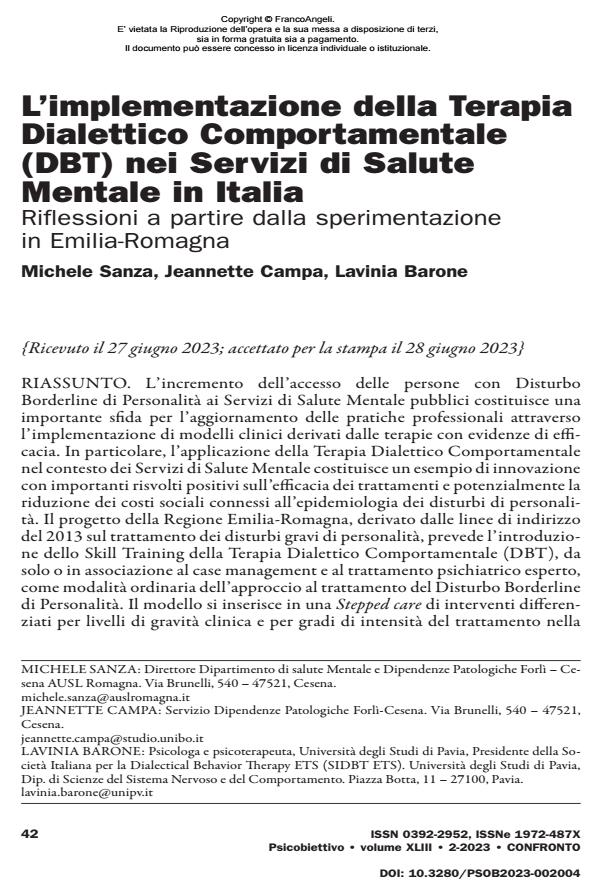L’implementazione della Terapia Dialettico Comportamentale (DBT) nei Servizi di Salute Mentale in Italia
Titolo Rivista PSICOBIETTIVO
Autori/Curatori Michele Sanza, Jeannette Campa, Lavinia Barone
Anno di pubblicazione 2023 Fascicolo 2023/2
Lingua Italiano Numero pagine 15 P. 42-56 Dimensione file 652 KB
DOI 10.3280/PSOB2023-002004
Il DOI è il codice a barre della proprietà intellettuale: per saperne di più
clicca qui
Qui sotto puoi vedere in anteprima la prima pagina di questo articolo.
Se questo articolo ti interessa, lo puoi acquistare (e scaricare in formato pdf) seguendo le facili indicazioni per acquistare il download credit. Acquista Download Credits per scaricare questo Articolo in formato PDF

FrancoAngeli è membro della Publishers International Linking Association, Inc (PILA), associazione indipendente e non profit per facilitare (attraverso i servizi tecnologici implementati da CrossRef.org) l’accesso degli studiosi ai contenuti digitali nelle pubblicazioni professionali e scientifiche.
L’incremento dell’accesso delle persone con Disturbo Borderline di Personalità ai Servizi di Salute Mentale pubblici costituisce una importante sfida per l’aggiornamento delle pratiche professionali attraverso l’implementazione di modelli clinici derivati dalle terapie con evidenze di effi- cacia. In particolare, l’applicazione della Terapia Dialettico Comportamentale nel contesto dei Servizi di Salute Mentale costituisce un esempio di innovazione con importanti risvolti positivi sull’efficacia dei trattamenti e potenzialmente la riduzione dei costi sociali connessi all’epidemiologia dei disturbi di personali- tà. Il progetto della Regione Emilia-Romagna, derivato dalle linee di indirizzo del 2013 sul trattamento dei disturbi gravi di personalità, prevede l’introduzio- ne dello Skill Training della Terapia Dialettico Comportamentale (DBT), da solo o in associazione al case management e al trattamento psichiatrico esperto, come modalità ordinaria dell’approccio al trattamento del Disturbo Borderline di Personalità. Il modello si inserisce in una Stepped care di interventi differen- ziati per livelli di gravità clinica e per gradi di intensità del trattamento nella cornice di valori di riferimento prioritari quali: servizi non giudicanti, empo- werment dei pazienti e degli operatori, priorità degli interventi di carattere psi cosociale nei confronti di quelli farmacologici.
Parole chiave:Disturbo Borderline di Personalità; Terapia Dialettico Comportamentale; Implementazione; Stepped care.
Michele Sanza, Jeannette Campa, Lavinia Barone, L’implementazione della Terapia Dialettico Comportamentale (DBT) nei Servizi di Salute Mentale in Italia in "PSICOBIETTIVO" 2/2023, pp 42-56, DOI: 10.3280/PSOB2023-002004